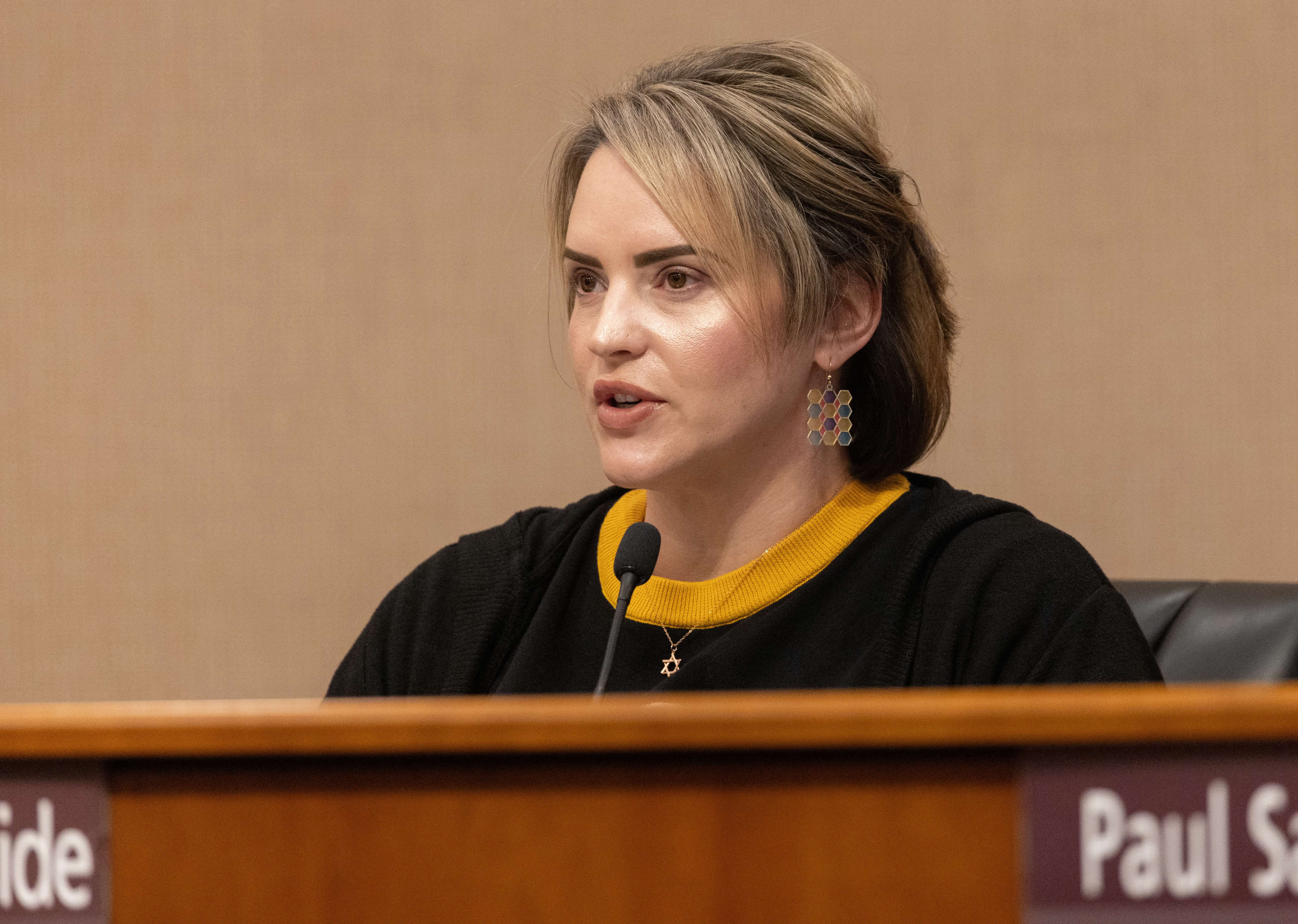Clackamas County commission, sheriff’s office at odds over budget
Published 6:00 am Tuesday, June 3, 2025

- Brandenburg Courtesy photo: CCSO
Though Clackamas County has recently championed its status as the only one of the three major counties not to face large budget deficits, it still has considerable challenges to overcome.
This was exemplified during a series of budget committee meetings last week, which mainly revolved around the Clackamas County Sheriff’s Office’s need for additional money beyond what the county had budgeted to fund its operations through the end of this fiscal year, as well as the sheriff’s office’s request for a larger budget increase than any other departments would receive for 2025-26.
In the end, the budget committee, which consists of county commissioners and community members, signed off on the supplemental budget request but allocated a few million dollars less than the sheriff’s office requested for the next fiscal year — which could mean service cuts — during a meeting Thursday, May 29.
The sheriff’s office seemed to struggle with two competing priorities this fiscal year: the need to keep a balanced budget and a directive from the board of commissioners to continue filling vacated positions. Officer staffing needs at the new county courthouse were also higher than anticipated, and the county’s general fund is constrained by a requirement to spend $15 million per year for 30 years to pay for the recently opened courthouse on the Red Soils campus.
During Chief Executive Officer Gary Schmidt’s budget message presentation, commissioners expressed shock that the proposed budget included an 11% increase for the sheriff’s office, which would result in the county government going into the red financially in 11 years and then building up a deficit of nearly $250 million by year 30 of the courthouse payments (other departments received a 4% boost in their budget for the coming fiscal year).
Commissioners and committee members were further miffed when they found out the sheriff’s office was requesting a supplemental budget adjustment to continue operations through June 30 because the department had overspent funds during the current fiscal year. The committee voted to approve the use of $6.5 million in funds to fill the hole.
Commissioner Paul Savas said in an interview that just last year, the county had created a sustainable budget model over the 30-year time period of the courthouse payments and made cuts to ensure financial sustainability.
“This isn’t going to work. I feel a little bit betrayed, if you want to know the truth,” Savas said at a meeting.
Though the board recommended the approval of the sheriff’s office budget for the next fiscal year at a lower number than the office requested, Chair Craig Roberts opposed the motion, worrying that it would have too substantial of an impact to services. And the sheriff’s office said via email that the county’s decision to provide less general fund money will result in 23 positions “that will remain vacant.
“While the full extent of the impact is not known yet, the Sheriff intends to fully utilize vacancy savings through attrition first,” the sheriff’s office wrote.
The committee directed Clackamas County Sheriff Angela Brandenburg to come to the board with ideas for cost-cutting measures by June 10.
What was the issue?
Brandenburg, who was first elected in 2020 and reelected in 2024, provided her side of the story at multiple meetings.
She said the sheriff’s office is already working to reduce costs and recently cut down on excessive overtime. The budget request for 2025-26, she said, would simply maintain the status quo. Further, Brandenburg said the board’s directive to fill vacant staff positions cost money and she was told by Schmidt that the county would find the money later.
“Presumably, even though County funds had not been sufficiently appropriated, the County will pay the bills to meet Sheriff’s Office operational expenses,” Brandenburg wrote to Roberts in February.
The department hired 58 sworn officers in 2024 and 52 in 2023, Brandenburg said. She also noted that the county has the lowest crime rate of the five most populous counties in the state.
“This is what a funded sheriff’s office costs,” she said. “I think it’s disingenuous to say that we have overspent or done something in violation. We have done exactly what this board has asked, which is to provide public safety services for this county.”
Commissioners retorted that they didn’t authorize unlimited spending for the sake of meeting hiring goals.
“My understanding was that you would hire within the money that you had. And that doesn’t seem to be what has been happening here to me. And that’s what worries me,” Commissioner Martha Schrader said.
Roberts, who previously served as the county sheriff, felt that the ongoing trend of the board having to approve supplemental budgets due to overages in sheriff’s office expenditures was something the county needed to address. He said if the expectation was established that there would be no budget adjustments, the department would know its spending limit.
What about the sheriff levy?
Another disagreement was how quickly the county should exhaust the sheriff levy. In 2021, county voters approved the extension of a local option levy that was initially instated in 2006. The levy provides approximately $13 million annually from 2022-2027 to help fund public safety in Clackamas County.
Commissioners posited that Brandenburg should have further tapped money from the levy prior to using additional general fund dollars. The county has around $9 million in levy funds to work with, according to staff data. Savas was alarmed to find out that no additional levy positions had been filled in the last year. That means 16 of the 86 levy-funded positions remain unfilled.
Money from the levy has to go toward “mental health/medical beds in the jail, body-worn cameras on sworn deputies, and additional patrol deputies, jail deputies, and detectives to support Sheriff’s Office critical functions.”
“The levy had the funds, still has the funds, so instead of tapping the well with water we tapped the well with very little water and that’s why we are here,” Savas said, later adding: “To fill the 16 positions, the most that would cost is $3 million. And you have $9 million. It doesn’t make any sense.”
However, the sheriff’s office said via email that 10 additional officers have accepted job offers, which means just six of the 92 positions are unfilled.
Brandenburg said that using the levy to backfill general fund shortfalls would be a serious misstep and reduce voter confidence in the levy. She also didn’t think that the county should exhaust levy dollars and added that indirect costs related to inflation chewed into levy funding.
“I would be negligent to continue to put monetary pressure on the levy and run it in the red,” Brandenburg said.
The sheriff’s office added that costs for the levy came in higher than had been projected when it passed.
“Costs that were not anticipated when the Levy was built by CCSO include the increase in personnel costs as a result of the new CCPOA (Clackamas County Peace Officers Association) collective bargaining agreement, additional allocated costs, and the new administrative overhead/indirect costs that that were previously covered by the County general fund,” the sheriff’s office said. “As a result of the County’s direction to burden the Sheriff’s Public Safety Levy with administrative overhead charges/indirect costs beginning FY2023-24, administrative overhead/indirect costs will total $9,568,228, and the Levy cycle is projected to end in a negative ending balance of ($4,920,081).”
Further complicating matters was that the sheriff’s office and the county’s finance office had different projections as far as how quickly money from the levy would run out.
Discrepancies between the two offices became a recurring issue during the budget process. Savas said he grew frustrated by receiving numbers that kept changing or were later determined to be incorrect.
“This has been a historic challenge and a historic problem we have to remedy; we owe it to the voters to be responsible with the dollars,” Savas said.
Along with approving the sheriff’s office budget, the committee passed a number of motions in response to the funding issue. Those covered areas such as more oversight earlier on in the process when a department goes over budget, adding additional auditing to make sure the county’s expenditures are in line with its 30-year forecast and requiring that the county finance department perform regular analysis of the sheriff’s office’s finances, with the idea that that the county and sheriff’s office’s finance departments will eventually merge.
Budget committee member James Karn felt that, considering the challenges the sheriff’s office has faced, the county should consider making the sheriff’s office its own taxing district and therefore separate from the rest of the county on budgeting matters.
“The main reason why I like it is because it gives the taxpayers, the voter, the option to decide what kind of service or how much service they want, and I like that,” he said.
Further challenges could be ahead
As was clear in the debate about sheriff’s office spending, the county does not have extra general fund money to spend. During his budget message, Schmidt cautioned that any loss in federal funding as a result of the Donald Trump administration’s plans to curb grants and other resources to local governments would lead to a loss of services.
“Because of the courthouse funding for the next 30 years, there is no cushion of general funds we can spend,” he said. “When federal dollars end, those programs and services funded by federal dollars will also end. This will have a dramatic impact on the public because many, many services — primarily in health, housing and human services — are funded federally unless the board directs otherwise.”
Schmidt emphasized that there are many departments that could desperately use additional funding for things like administering Medicaid claims, helping veterans with financial assistance, hiring an assistant for the district attorney, performing code enforcement and more. The county budget committee did shift funds to provide the Medical Examiner’s Office with a staff member that could help the county pick up dead bodies more quickly.
Overall, the committee recommended the approval of a budget worth just over $1.5 billion. The board of commissioners will consider the budget for approval at a later meeting.





